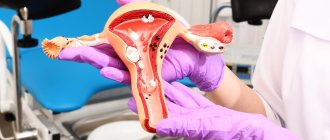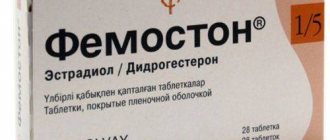Klimonorm
Use during pregnancy and breastfeeding
HRT is not carried out during pregnancy and lactation.
Large-scale epidemiological studies of steroid hormones used for contraception or HRT have found no increased risk of birth defects in children born to women who took these hormones before pregnancy, or teratogenic effects of the hormones when accidentally taken during early pregnancy.
Small amounts of sex hormones can be excreted in breast milk.
Use for liver dysfunction
The use of the drug is contraindicated in case of current or history of liver tumors (benign or malignant), severe liver diseases.
Klimonorm should be prescribed with caution to patients with cholestatic jaundice or cholestatic itching during pregnancy.
For mild liver dysfunction, incl. in various forms of hyperbilirubinemia, such as Dubin-Johnson syndrome or Rotor syndrome, medical supervision is necessary, as well as periodic liver function tests. If liver function tests worsen, HRT should be discontinued.
special instructions
Klimonorm is not used for contraception.
Before starting or resuming HRT, a woman is recommended to undergo a thorough general medical and gynecological examination (including examination of the mammary glands and cytological examination of cervical mucus) and exclude pregnancy. In addition, disorders of the blood coagulation system should be excluded. Control examinations should be carried out periodically.
If contraception is necessary, non-hormonal methods should be used (with the exception of calendar and temperature methods). If pregnancy is suspected, you should stop taking the tablets until pregnancy has been ruled out.
If any of the following conditions or risk factors are present or worsening, the individual risk-benefit ratio of treatment should be assessed before starting or continuing HRT.
Venous thromboembolism
A number of controlled randomized as well as epidemiological studies have revealed an increased relative risk of developing venous thromboembolism (VTE) during HRT, i.e. deep vein thrombosis or pulmonary embolism. Therefore, when prescribing HRT to women with risk factors for VTE, the risk-benefit ratio of treatment should be carefully weighed and discussed with the patient.
Risk factors for developing VTE include individual and family history (the presence of VTE in first-degree relatives at a relatively young age may indicate a genetic predisposition) and severe obesity. The risk of VTE also increases with age. The possible role of varicose veins in the development of VTE remains controversial.
The risk of VTE may temporarily increase with prolonged immobilization, major elective and trauma surgery, or major trauma. Depending on the cause or duration of immobilization, the question of the advisability of temporarily stopping HRT should be decided.
Treatment should be stopped immediately if symptoms of thrombotic disorders appear or if their occurrence is suspected.
Arterial thromboembolism
Randomized controlled trials with long-term use of combined conjugated estrogens and medroxyprogesterone acetate did not provide evidence of a beneficial effect on the cardiovascular system. In large-scale clinical trials of this compound, a possible increased risk of coronary disease was identified in the first year of use. An increased risk of stroke was also found. To date, no long-term randomized controlled trials have been conducted with other HRT drugs to identify beneficial effects on cardiovascular morbidity and mortality. It is therefore unknown whether this increased risk applies to HRT products containing other types of estrogens and progestogens.
Endometrial cancer
With long-term estrogen monotherapy, the risk of developing endometrial hyperplasia or carcinoma increases. Studies have confirmed that the addition of gestagens reduces the risk of endometrial hyperplasia and cancer.
Mammary cancer
Clinical trial data and observational studies have found an increase in the relative risk of developing breast cancer in women receiving HRT for several years. This may be due to earlier diagnosis, the biological effects of HRT, or a combination of both. The relative risk increases with the duration of treatment (by 2.3% when used for a year), possibly increasing even more when estrogens are combined with progestogens. This increase is comparable to the increase in the risk of breast cancer in women with each year of delay in the onset of natural menopause (by 2.8% per year of delay), as well as with obesity and alcohol abuse. The increased risk gradually decreases to normal levels during the first 5 years after stopping HRT.
According to research, breast cancer detected in women receiving HRT is usually more differentiated than in women not receiving it.
HRT increases mammographic breast density, which in some cases may have a negative effect on X-ray detection of breast cancer.
Liver tumors
During the use of sex steroids, which include drugs for HRT, in rare cases benign, and even more rarely, malignant liver tumors were observed. In some cases, these tumors have resulted in life-threatening intraperitoneal bleeding. If there is pain in the upper abdomen, an enlarged liver, or signs of intraperitoneal bleeding, the differential diagnosis should take into account the possibility of a liver tumor.
Cholelithiasis
It is known that estrogens increase the lithogenicity of bile. Some women are predisposed to developing gallstones when treated with estrogen.
Other states
Treatment should be stopped immediately if migraine-like or frequent and unusually severe headaches appear for the first time, as well as if other symptoms appear that are possible precursors of a thrombotic stroke of the brain.
The relationship between HRT and the development of clinically significant arterial hypertension has not been established. A slight increase in blood pressure has been described in women receiving HRT; a clinically significant increase is rare. However, in some cases, if persistent clinically significant arterial hypertension develops while taking HRT, discontinuation of HRT may be considered.
For mild liver dysfunction, incl. in various forms of hyperbilirubinemia, such as Dubin-Johnson syndrome or Rotor syndrome, medical supervision is necessary, as well as periodic liver function tests. If liver function tests worsen, HRT should be discontinued.
If cholestatic jaundice or cholestatic pruritus recurs, which was observed for the first time during pregnancy or previous treatment with sex steroid hormones, HRT should be stopped immediately.
Special monitoring is required for women with moderately elevated TG levels. In such cases, the use of HRT may cause a further increase in the level of TG in the blood, which increases the risk of developing acute pancreatitis.
Although HRT may affect peripheral insulin resistance and glucose tolerance, there is usually no need to change the treatment regimen of diabetic patients when undergoing HRT. However, patients with diabetes require monitoring when undergoing HRT.
Some patients under the influence of HRT may develop undesirable manifestations of estrogen stimulation, such as abnormal uterine bleeding. Frequent or persistent pathological uterine bleeding during treatment is an indication for endometrial examination.
If treatment for irregular menstrual cycles does not produce results, an examination should be performed to exclude an organic disease.
Under the influence of estrogens, it is possible to increase the size of uterine fibroids. In this case, treatment should be stopped.
It is recommended to discontinue treatment if endometriosis relapses during HRT.
If prolactinoma is suspected, this disease should be excluded before starting treatment.
In some cases, chloasma may occur, especially in women with a history of chloasma during pregnancy. During HRT, women prone to chloasma should avoid prolonged exposure to the sun or UV radiation.
The following diseases and conditions may occur or be aggravated by HRT: epilepsy, benign breast tumor, bronchial asthma, migraine, porphyria, otosclerosis, systemic lupus erythematosus, chorea minor. Although the connection of these diseases and conditions with HRT has not been proven, such patients should be under the supervision of a doctor when undergoing HRT.
Impact on laboratory results
Taking sex steroids can affect biochemical indicators of liver, thyroid, adrenal and kidney function, plasma levels of transport proteins such as corticosteroid binding globulin and lipid/lipoprotein fractions, indicators of carbohydrate metabolism, coagulation and fibrinolysis.
Impact on the ability to drive vehicles and operate machinery
Does not affect.









